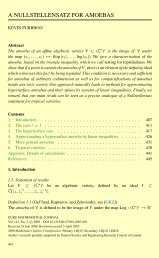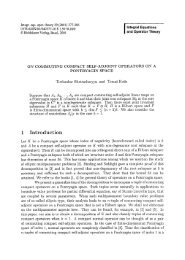computing lives - FTP Directory Listing
computing lives - FTP Directory Listing
computing lives - FTP Directory Listing
Create successful ePaper yourself
Turn your PDF publications into a flip-book with our unique Google optimized e-Paper software.
A<br />
Computer Previous Page | Contents | Zoom in | Zoom out | Front Cover | Search Issue | Next Page M S BE<br />
aG<br />
F<br />
94<br />
COMPUTER<br />
THE PROFESSION<br />
Currently, it has taken the form of an<br />
eBook reader with an easy-to-read<br />
display. However, even when we leverage<br />
an innovative distribution system<br />
using wireless technology, presenting<br />
static books falls short of employing<br />
the computer to full advantage.<br />
With larger displays, fiexible and<br />
lightweight units, and full color we<br />
may see more dramatic changes.<br />
Will eInk replace printed paper in<br />
all domains or be the savior of traditional<br />
newspapers? If the technology<br />
matures the consequences will be<br />
dramatic for many industries. But this<br />
particular if entails speculation.<br />
Instead of focusing on possible<br />
advances in new technologies, we<br />
observe that change may also come<br />
based on ingredients that have been<br />
present for some time. Email and TCP/<br />
IP provide good examples. It took<br />
many years from when the technology<br />
and standards emerged to when<br />
they saturated society and made a<br />
major impact.<br />
POS<br />
The technology that provides<br />
our case study here is the simple<br />
point-of-sale (POS) terminal. This<br />
technology was not developed to<br />
change the world, but simply to<br />
make monetary transactions easier.<br />
By using a credit or cash card, the<br />
terminal lets us perform an alldigital<br />
transaction with no cash<br />
involved. The advantages of this<br />
are so substantial that in many<br />
countries a large percentage of all<br />
monetary transactions are digital,<br />
based on POS terminals or using<br />
credit cards over the Internet. Data<br />
is captured automatically and can be<br />
transferred at almost no cost.<br />
At the same time, this information<br />
can be used directly for inventory<br />
Continued from page 96<br />
control, accounting, and statistics.<br />
In my home country, Norway, people<br />
can avoid cash altogether, because<br />
all shops, hotels, restaurants, gas stations,<br />
cabs, and many buses allow<br />
digital payment. Most banks offer free<br />
service, and cards are used also for<br />
very small amounts. Even the pizza<br />
boy brings along a wireless POS terminal.<br />
Looking at value, 98 percent of<br />
all monetary transactions in Norway<br />
are digital. In Stockholm, people can<br />
even pay their bus fare by cell phone.<br />
Small countries have an advantage<br />
and can often offer high dissemination<br />
numbers for new technologies.<br />
National standards are easier to<br />
implement in a small country than in<br />
a large one. Fewer installations make<br />
it easier to update equipment, while<br />
a homogeneous population makes it<br />
Small countries have an advantage and can often offer<br />
high dissemination numbers for new technologies.<br />
simpler for people to accept new services.<br />
However, larger countries are<br />
following suit in the digital economy.<br />
A few years ago travelers needed<br />
cash when in cities such as Rome and<br />
Madrid. Today nearly all businesses<br />
accept a card.<br />
CASHfiFREE SOCIETY<br />
When only a small fraction of<br />
transactions are in cash an interesting<br />
question arises: Can we remove<br />
cash altogether? Money, in the form<br />
of coins, has been in use for nearly<br />
three thousand years. Paper bills<br />
have been used in Europe for nearly<br />
four hundred years, and much longer<br />
than that in China. It seems dramatic<br />
to convert to a true digital economy.<br />
There are, however, many advantages<br />
to going digital. Great savings<br />
can be achieved for businesses if we<br />
avoid storing, counting, handling, and<br />
transporting cash.<br />
The advantages for society<br />
as a whole may be even greater,<br />
especially if cash is removed altogether.<br />
As we learn from the news<br />
every day, cash encourages crime.<br />
The public may experience that a<br />
wallet is stolen from a pocket, or<br />
more severely, become the victim<br />
of armed robbery. Institutions such<br />
as banks and security transports<br />
must spend signiflcant resources to<br />
thwart criminals and sometimes still<br />
fail to deter them. Death and both<br />
physical and psychological injuries<br />
can be the consequences of holding<br />
all this “bait” in the form of cash.<br />
It would be naive to expect crime<br />
to disappear in a digital economy.<br />
Credit card fraud is already a daily<br />
occurrence. However, today it is stimulated<br />
by the possibility of retrieving<br />
the stolen money in cash from ATMs.<br />
Without cash it will be much easier to<br />
follow the transactions.<br />
We can, however, realistically<br />
hope to make being a criminal less<br />
convenient. A monetary economy is<br />
much more effective than bartering.<br />
People understood this thousands<br />
of years ago. It was easier then to<br />
sell a horse for money that could be<br />
spent freely than to trade it for a cow<br />
and some chickens on the side. The<br />
seller might not need chickens, or the<br />
potential horse buyer might not have<br />
a cow for sale.<br />
What we could expect by going<br />
digital is to enjoy the advantages of<br />
the monetary system without being<br />
threatened by criminals. The pusher<br />
down the street, for example, would<br />
have problems if customers no longer<br />
had anonymous cash handy for their<br />
transactions. They would be forced to<br />
accept gold, PCs, TVs, and refrigerators<br />
instead, thereby confronting all<br />
the hassles of a barter economy.<br />
DIGITAL CRIME<br />
Criminals can also go digital,<br />
although this requires <strong>computing</strong><br />
competence. Today, with improved<br />
information security systems, successful<br />
cybercrime implies a fairly<br />
high level of competence. Such skill<br />
can also be sold in the open economy<br />
A<br />
Computer Previous Page | Contents | Zoom in | Zoom out | Front Cover | Search Issue | Next Page M S BE<br />
aG<br />
F

















